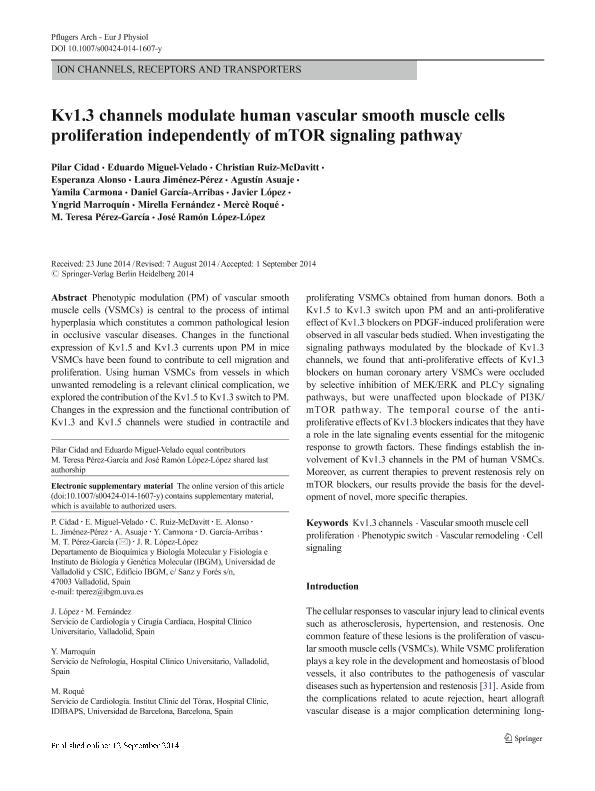Mostrar el registro sencillo del ítem
dc.contributor.author
Cidad, Pilar
dc.contributor.author
Velado, Eduardo Miguel
dc.contributor.author
Ruiz McDavitt, Christian
dc.contributor.author
Alonso, Esperanza
dc.contributor.author
Jiménez Pérez, Laura
dc.contributor.author
Asuaje, Agustín

dc.contributor.author
Carmona Viglianco, Yamila Virginia

dc.contributor.author
García Arribas, Daniel
dc.contributor.author
López, Javier
dc.contributor.author
Marroquín, Yngrid
dc.contributor.author
Fernández, Mirella
dc.contributor.author
Roqué, Mercè
dc.contributor.author
Pérez García, M. Teresa
dc.contributor.author
López López, José Ramón
dc.date.available
2019-07-05T13:27:55Z
dc.date.issued
2015-08
dc.identifier.citation
Cidad, Pilar; Velado, Eduardo Miguel; Ruiz McDavitt, Christian; Alonso, Esperanza; Jiménez Pérez, Laura; et al.; Kv1.3 channels modulate human vascular smooth muscle cells proliferation independently of mTOR signaling pathway; Springer; Pflugers Archiv-European Journal of Physiology; 467; 8; 8-2015; 1711-1722
dc.identifier.issn
0031-6768
dc.identifier.uri
http://hdl.handle.net/11336/79195
dc.description.abstract
Phenotypic modulation (PM) of vascular smooth muscle cells (VSMCs) is central to the process of intimal hyperplasia which constitutes a common pathological lesion in occlusive vascular diseases. Changes in the functional expression of Kv1.5 and Kv1.3 currents upon PM in mice VSMCs have been found to contribute to cell migration and proliferation. Using human VSMCs from vessels in which unwanted remodeling is a relevant clinical complication, we explored the contribution of the Kv1.5 to Kv1.3 switch to PM. Changes in the expression and the functional contribution of Kv1.3 and Kv1.5 channels were studied in contractile and proliferating VSMCs obtained from human donors. Both a Kv1.5 to Kv1.3 switch upon PM and an anti-proliferative effect of Kv1.3 blockers on PDGF-induced proliferation were observed in all vascular beds studied. When investigating the signaling pathways modulated by the blockade of Kv1.3 channels, we found that anti-proliferative effects of Kv1.3 blockers on human coronary artery VSMCs were occluded by selective inhibition of MEK/ERK and PLCγ signaling pathways, but were unaffected upon blockade of PI3K/mTOR pathway. The temporal course of the anti-proliferative effects of Kv1.3 blockers indicates that they have a role in the late signaling events essential for the mitogenic response to growth factors. These findings establish the involvement of Kv1.3 channels in the PM of human VSMCs. Moreover, as current therapies to prevent restenosis rely on mTOR blockers, our results provide the basis for the development of novel, more specific therapies.
dc.format
application/pdf
dc.language.iso
eng
dc.publisher
Springer

dc.rights
info:eu-repo/semantics/openAccess
dc.rights.uri
https://creativecommons.org/licenses/by-nc-sa/2.5/ar/
dc.subject
Cell Signaling
dc.subject
Kv1.3 Channels
dc.subject
Phenotypic Switch
dc.subject
Vascular Remodeling
dc.subject
Vascular Smooth Muscle Cell Proliferation
dc.title
Kv1.3 channels modulate human vascular smooth muscle cells proliferation independently of mTOR signaling pathway
dc.type
info:eu-repo/semantics/article
dc.type
info:ar-repo/semantics/artículo
dc.type
info:eu-repo/semantics/publishedVersion
dc.date.updated
2019-06-11T15:17:09Z
dc.identifier.eissn
1432-2013
dc.journal.volume
467
dc.journal.number
8
dc.journal.pagination
1711-1722
dc.journal.pais
Alemania

dc.journal.ciudad
Berlín
dc.description.fil
Fil: Cidad, Pilar. Universidad de Valladolid; España. Consejo Superior de Investigaciones Científicas; España
dc.description.fil
Fil: Velado, Eduardo Miguel. Universidad de Valladolid; España. Consejo Superior de Investigaciones Científicas; España
dc.description.fil
Fil: Ruiz McDavitt, Christian. Universidad de Valladolid; España. Consejo Superior de Investigaciones Científicas; España
dc.description.fil
Fil: Alonso, Esperanza. Universidad de Valladolid; España. Consejo Superior de Investigaciones Científicas; España
dc.description.fil
Fil: Jiménez Pérez, Laura. Universidad de Valladolid; España. Consejo Superior de Investigaciones Científicas; España
dc.description.fil
Fil: Asuaje, Agustín. Consejo Nacional de Investigaciones Científicas y Técnicas. Centro Científico Tecnológico Conicet - La Plata; Argentina. Universidad de Valladolid; España. Consejo Superior de Investigaciones Científicas; España
dc.description.fil
Fil: Carmona Viglianco, Yamila Virginia. Consejo Nacional de Investigaciones Científicas y Técnicas. Centro Científico Tecnológico Conicet - La Plata; Argentina. Universidad de Valladolid; España. Consejo Superior de Investigaciones Científicas; España
dc.description.fil
Fil: García Arribas, Daniel. Universidad de Valladolid; España. Consejo Superior de Investigaciones Científicas; España
dc.description.fil
Fil: López, Javier. Hospital Clínico Universitario. Servicio de Cardiología y Cirugía Cardíaca; España
dc.description.fil
Fil: Marroquín, Yngrid. Hospital Clínico Universitario. Servicio de Nefrología; España
dc.description.fil
Fil: Fernández, Mirella. Hospital Clínico Universitario. Servicio de Cardiología y Cirugía Cardíaca; España
dc.description.fil
Fil: Roqué, Mercè. Universidad de Barcelona; España
dc.description.fil
Fil: Pérez García, M. Teresa. Universidad de Valladolid; España. Consejo Superior de Investigaciones Científicas; España
dc.description.fil
Fil: López López, José Ramón. Universidad de Valladolid; España. Consejo Superior de Investigaciones Científicas; España
dc.journal.title
Pflugers Archiv-European Journal of Physiology

dc.relation.alternativeid
info:eu-repo/semantics/altIdentifier/doi/http://dx.doi.org/10.1007/s00424-014-1607-y
dc.relation.alternativeid
info:eu-repo/semantics/altIdentifier/url/https://link.springer.com/article/10.1007%2Fs00424-014-1607-y
Archivos asociados
